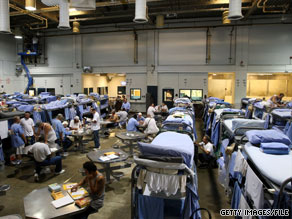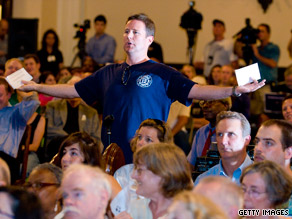There's a whole lot to not like about the so-called Obamacare health care reform plan that's being cussed and discussed in D.C. and all over the country.
Folks are put off by the horrible examples they hear about in Canada and European nations, where lifesaving procedures often end up in an infernal game show -- if the patient survives while his approvals make their way through the bureaucratic morass, he gets his operation. Others, especially older folks, are wondering what this end-of-life counseling is all about, and it's enough to scare anyone. It's this last sticking point that may send the whole thing to the showers; one can only hope.
I haven't read the bill. Are you kidding? And I'm sure you haven't. And I'll bet your favorite Congressman or Senator hasn't either. You don't read it; you weigh it. It's more than 1,000 pages. And I've read enough government documents and House bills to know how they're presented. They're written in some off-brand variation of English, and even a person with a normal attention span (leave me out of this!) will have trouble. By page five you realize all this is beginning to sound like all adults in the old Charlie Brown TV specials: "WA wa WA wa WA!" That's when you realize, man, there's only 995 pages to go. So forget that.
In an earlier post I dissected Obamacare in light of my own health insurance package and found the whole thing wanting. For those who haven't read it (for shame!) I expressed what national health care coverage, which is doomed to suck, might do to those private health care plans which have less of the suckiness quotient.
I had an early red flag when the first draft of the Obama/Reid/Pelosi plan, when the American Medical Association (AMA) threw its endorsement behind the proposal. That's when I knew there was a reason for me to despise the idea.
I mentioned how the American health care system is broken. There's little disagreement there; the only real debate involves either how bad it's broken, or who is to blame. And there are plenty of candidates for blame -- trial lawyers, insurance companies, HMO's, drug companies, or medical technology. If I was to throw blame around, the AMA would be my first and biggest target.
Here's where the AMA comes in to the scene. They're there to insure a monopoly takes place. It doesn't matter what kind of medical care is required; there's usually a physician in the mix somewhere.
Understand, if I needed my appendix taken out, I'm not going to go to a blacksmith. For major work done on my heart, I'm not going to go call some shade tree mechanic. But "normal" stuff -- a cold, the flu, a broken bone -- there's not a lot the doctor can really do. Prescribe an antibiotic, read your X rays, monitor your progress (as if you're too dumb to take care of yourself), and that's about it.
Maybe my own health background (which includes enough broken bones to stock a NASCAR racing team) has something to do with it, but when I go to a doctor for anything, I'm almost never surprised by the diagnosis. Or the treatment.
Some years ago I separated some cartilage in my ribs, which was painful enough to catch my full attention. The doc interpreted my X rays, told me what I had, told me to take it easy (d'oh -- all these years of medical school came to that), and prescribed pain medication. A nurse or physician's assistant could have done that (except probably write the prescription, Tylenol with a blast of codeine, which I didn't even use). I developed my own flexibility and range-of-motion exercises, and oversaw my own rehab.
=========================
But if you hang around an emergency room long enough, you may find many medical complaints are pretty straightforward.
According to the U.S. Department of Health and Human Services, these are the most frequent reasons patients give for emergency room visits in 2006 (these numbers are from The World Almanac):
1 - Stomach and abdominal pain, cramps, and spasms (6.8%).
2 - Chest pain and related symptoms (5.4%).
3 - Fever (3.8%)
In the 2% range: 4 - Headaches. 5 - Back symptoms. 6 - Shortness of breath. 7 - Cough. 8 - Vomiting. 9 - Pain not related to a specific body system.
In the 1% range: 10 - Symptoms referable to throat. 11 - Lacerations and cuts, upper extremity. 12 - Nausea. 13 - Accident, not otherwise specified. 14 - Motor vehicle accident. 15 - Earache. 16 - Vertigo, dizziness. 17 - Leg symptoms. 18 - Skin rash. 19 - Unspecified type injury to head, neck, face. 20 - Low back symptoms.
A whopping 53 percent of the emergency room visits were for reasons that were not in this top 20, so you can take these above numbers and fold/spindle/mutilate them.
Getting to the doctor's office, the number one reason for a visit (at 7.4%) is for a general medical exam. Unspecified progress visits rank second, at 5.7%, then cough (3%).
From there, in the 2% range, are: 4 - Postoperative visit. 5 - Routine prenatal examination. 6 - Gynecological examination. 7 - Medication, unspecified. 8 - Stomach, abdominal pain, cramps, spasms. 9 - Knee symptoms. 10 - Well-baby examination.
In the 1% range are, in order: Back symptoms, throat problems, unspecified test results, vision, fever, hypertension, earache or ear infection, headache, skin rash, and nasal congestion. Again, 56 percent of doctor's visits don't fall in the top 20 list.
And what's the most-prescribed drug for ambulatory patients? Analgesics, at 13.6 percent (nearly triple whatever is in the #2 slot). Analgesics. Think aspirin. Think Tylenol, plus whatever proprietary versions of the same.
=========================
OK. There are some real emergencies in the above list. Anything involving internal organs, chest pains, things like that are best left to the professionals. Many of the other health complaints can probably be handled just as effectively by a nurse practitioner, or a physicians' assistant. Or even someone who served as a medic or corpsman in the military.
Here's my modest proposal: If anyone's interested in reforming health care, the way to do it would be to gut the AMA. Seriously. The way to reform health care would be to open the door so some of these others -- the PA's, the nurse practitioners, the Army medics -- can hang out their shingles and do a little medical work. By themselves they'll dispense with the bulk of medical complaints -- the colds, the "crud," the sprains and breaks. Again, probably as effectively as it's done now, but without the so-called priesthood of the medical industry running things.
This begs the question: What sort of consumer protections are there in this scenario? My answer: As good as there are now. See, I favor a free-market approach; under this scenario the hacks and quacks will expose themselves fairly quickly. I know this doesn't exactly create nice warm feelings right away, but neither should the consumer protections that are in place now. How many doctors are out there now that should not be practicing? Granted, this consumer-protection angle is one that needs work, but it's a lot more doable -- and much more worth doing -- than a nationalized health care system.
I'm also quite an advocate of what they call "wellness" in the industry. I try to eat well (and when you figure in the cost of double-bypass surgery, that stuff on the fast-food dollar menu becomes less of a bargain). I try to develop healthier habits, and enjoy life while I'm about it. And my daily bicycle ride does what Prozac used to do, only without the goofy side effects.
OK, so I still need to work on this habit I have of running first, then looking ... As you can surmise, most of my own health concerns involve someone in orthopaedics, and these doctors are considered more like carpenters than physicians. Read the X ray. Align the break. Dig out screwdriver and pliers if a little bone reassembly is required. Orthopods are not really considered part of the priesthood.
On the surface this scenario does sound like an enormous risk to the human body, but then much of the medical industry is overkill. And yeah, a lot of the procedures done seem to be more tuned to the bottom line than actual patient care. How many unnecessary surgeries are done -- particularly when an insurance company or government is footing the bill so the one buying the drinks isn't likely to complain? How many unnecessary prescriptions are dispensed, what with doctors being so in bed with the drug companies?
So if Congress wants to do something useful, they can hash out these issues instead of this chasing the wind they're doing right now.











































